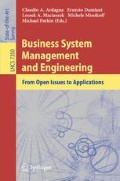Abstract
Stakeholders demand trustworthy information systems. Trust is a subjective but strong belief in the ability of a system to perform dependably within a specified context defined by (necessarily changing) functional and nonfunctional requirements. Trust assumes satisfaction of various quality goals (including reliability, security, accuracy, efficiency, but also adaptability). A necessary condition for a trustworthy system is to build it based on a complexity-minimizing architectural style. This paper presents a layered/tiered architectural style for construction of service based applications such that dependencies between software elements are constrained to allow lifecycle management of software complexity. The presented style is an extension of the author’s PCBMER (Presentation, Controller, Bean, Mediator, Entity, and Resource) meta-architecture for custom software systems.
Access this chapter
Tax calculation will be finalised at checkout
Purchases are for personal use only
Preview
Unable to display preview. Download preview PDF.
References
Alur, D., Crupi, J., Malks, D.: Core J2EE Patterns: Best Practices and Design Strategies, 2nd edn., 528 p. Prentice Hall (2003)
Artz, D., Gil, Y.: A Survey of Trust in Computer Science and the Semantic Web. Journal of Web Semantics: Science, Services and Agents on the World Wide Web, 40 p. (2007), http://www.isi.edu/~gil/papers/jws-trust-07.pdf
Capra, F.: The Turning Point. Science, Society, and the Rising Culture, 516 p. Flamingo (1982)
Christiaanse, E.: Performance Benefits Through Integration Hubs. Comm. ACM 48(4), 95–100 (2005)
Cloud Computing, http://en.wikipedia.org/wiki/Cloud_computing
Corning, P.A.: The Re-Emergence of “Emergence”: A Venerable Concept in Search of a Theory. Complexity 7(6), 18–30 (2002)
Fensel, D., Lausen, H., Polleres, A., de Bruijn, J., Stollberg, M., Roman, D., Dominigue, J.: Enabling Semantic Web Services. The Web Service Modeling Ontology, 190 p. Springer (2007)
ISO 9126 Software Quality Characteristics, http://www.sqa.net/iso9126.html
Jackson, M.: Systems Thinking: Creative Holism for Managers, 352 p. John Wiley & Sons, Ltd. (2003)
Kanitscheider, B.: Beyond Reductionism and Holism. The Approach to Synergetics. In: Agazzi, E., Montecucco, L. (eds.) Complexity and Emergence. Proceedings of the Annual Meeting of the International Academy of the Philosophy of Science, pp. 39–44. World Scientific (2002)
Koestler, A.: Bricks to Babel, 697 p. Random House (1980)
Koestler, A.: The Ghost in the Machine, 384 p. Hutchinson(1967)
Looijen, R.C.: Holism and Reductionism in Biology and Ecology. The Mutual Dependence of Higher and Lower Level Research Programmes, 350 p. Kluwer Academic Publishers (2000)
Maciaszek, L.A.: Adaptive Integration of Enterprise and B2B Applications. In: Filipe, J., Shishkov, B., Helfert, M. (eds.) ICSOFT 2006. CCIS, vol. 10, pp. 3–15. Springer, Heidelberg (2008)
Maciaszek, L.A.: An Investigation of Software Holons – the ‘adHOCS’ Approach. Argumenta Oeconomica 19(1-2), 1–40 (2007)
Maciaszek, L.A.: Dependency Structure Analysis for Managing Architectural Intent. In: Huzar, Z., Mazur, Z. (eds.) Inżynieria Oprogramowania – Od Teorii do Praktyki, pp. 13–26. Wydawnictwa Komunikacji i Łączności, Warszawa (2008) (in Polish, but English version available from the author)
Maciaszek, L.A.: Architecture-Centric Software Quality Management. In: Cordeiro, J., Hammoudi, S., Filipe, J. (eds.) WEBIST 2008. LNBIP, vol. 18, pp. 11–26. Springer, Heidelberg (2009)
Maciaszek, L.A.: From Hubs Via Holons to an Adaptive Meta-Architecture – the “AD-HOC” Approach. In: Sacha, K. (ed.) Software Engineering Techniques: Design for Quality. IFIP, vol. 227, pp. 1–13. Springer, Boston (2006)
Maciaszek, L.A., Liong, B.L.: Practical Software Engineering. A Case-Study Approach, 864 p. Addison-Wesley (2005)
Maciaszek, L.A.: Requirements Analysis and System Design, 3rd edn., 642 p. Addison-Wesley (2007)
Petrie, C., Bussler, C.: The Myth of Open Web Services. The Rise of the Service Parks. IEEE Internet Computing, 80–82 (May-June 2008)
Rozanski, N., Woods, E.: Software Systems Architecture, 530 p. Addison-Wesley (2005)
Wegner, P.: Why interaction is more powerful than algorithms. Comm. ACM 40(5), 80–91 (1997)
Author information
Authors and Affiliations
Editor information
Editors and Affiliations
Rights and permissions
Copyright information
© 2012 Springer-Verlag Berlin Heidelberg
About this chapter
Cite this chapter
Maciaszek, L.A. (2012). An Architectural Style for Trustworthy Adaptive Service Based Applications. In: Ardagna, C.A., Damiani, E., Maciaszek, L.A., Missikoff, M., Parkin, M. (eds) Business System Management and Engineering. Lecture Notes in Computer Science, vol 7350. Springer, Berlin, Heidelberg. https://doi.org/10.1007/978-3-642-32439-0_7
Download citation
DOI: https://doi.org/10.1007/978-3-642-32439-0_7
Publisher Name: Springer, Berlin, Heidelberg
Print ISBN: 978-3-642-32438-3
Online ISBN: 978-3-642-32439-0
eBook Packages: Computer ScienceComputer Science (R0)

